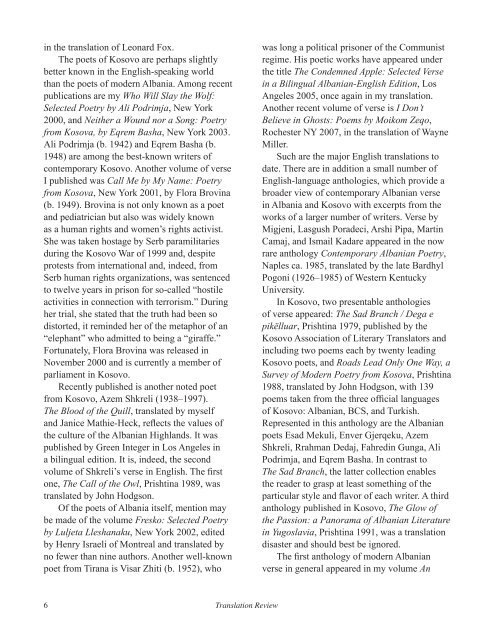Table of contents - The University of Texas at Dallas
Table of contents - The University of Texas at Dallas
Table of contents - The University of Texas at Dallas
Create successful ePaper yourself
Turn your PDF publications into a flip-book with our unique Google optimized e-Paper software.
in the transl<strong>at</strong>ion <strong>of</strong> Leonard Fox.<br />
<strong>The</strong> poets <strong>of</strong> Kosovo are perhaps slightly<br />
better known in the English-speaking world<br />
than the poets <strong>of</strong> modern Albania. Among recent<br />
public<strong>at</strong>ions are my Who Will Slay the Wolf:<br />
Selected Poetry by Ali Podrimja, New York<br />
2000, and Neither a Wound nor a Song: Poetry<br />
from Kosova, by Eqrem Basha, New York 2003.<br />
Ali Podrimja (b. 1942) and Eqrem Basha (b.<br />
1948) are among the best-known writers <strong>of</strong><br />
contemporary Kosovo. Another volume <strong>of</strong> verse<br />
I published was Call Me by My Name: Poetry<br />
from Kosova, New York 2001, by Flora Brovina<br />
(b. 1949). Brovina is not only known as a poet<br />
and pedi<strong>at</strong>rician but also was widely known<br />
as a human rights and women’s rights activist.<br />
She was taken hostage by Serb paramilitaries<br />
during the Kosovo War <strong>of</strong> 1999 and, despite<br />
protests from intern<strong>at</strong>ional and, indeed, from<br />
Serb human rights organiz<strong>at</strong>ions, was sentenced<br />
to twelve years in prison for so-called “hostile<br />
activities in connection with terrorism.” During<br />
her trial, she st<strong>at</strong>ed th<strong>at</strong> the truth had been so<br />
distorted, it reminded her <strong>of</strong> the metaphor <strong>of</strong> an<br />
“elephant” who admitted to being a “giraffe.”<br />
Fortun<strong>at</strong>ely, Flora Brovina was released in<br />
November 2000 and is currently a member <strong>of</strong><br />
parliament in Kosovo.<br />
Recently published is another noted poet<br />
from Kosovo, Azem Shkreli (1938–1997).<br />
<strong>The</strong> Blood <strong>of</strong> the Quill, transl<strong>at</strong>ed by myself<br />
and Janice M<strong>at</strong>hie-Heck, reflects the values <strong>of</strong><br />
the culture <strong>of</strong> the Albanian Highlands. It was<br />
published by Green Integer in Los Angeles in<br />
a bilingual edition. It is, indeed, the second<br />
volume <strong>of</strong> Shkreli’s verse in English. <strong>The</strong> first<br />
one, <strong>The</strong> Call <strong>of</strong> the Owl, Prishtina 1989, was<br />
transl<strong>at</strong>ed by John Hodgson.<br />
Of the poets <strong>of</strong> Albania itself, mention may<br />
be made <strong>of</strong> the volume Fresko: Selected Poetry<br />
by Luljeta Lleshanaku, New York 2002, edited<br />
by Henry Israeli <strong>of</strong> Montreal and transl<strong>at</strong>ed by<br />
no fewer than nine authors. Another well-known<br />
poet from Tirana is Visar Zhiti (b. 1952), who<br />
was long a political prisoner <strong>of</strong> the Communist<br />
regime. His poetic works have appeared under<br />
the title <strong>The</strong> Condemned Apple: Selected Verse<br />
in a Bilingual Albanian-English Edition, Los<br />
Angeles 2005, once again in my transl<strong>at</strong>ion.<br />
Another recent volume <strong>of</strong> verse is I Don’t<br />
Believe in Ghosts: Poems by Moikom Zeqo,<br />
Rochester NY 2007, in the transl<strong>at</strong>ion <strong>of</strong> Wayne<br />
Miller.<br />
Such are the major English transl<strong>at</strong>ions to<br />
d<strong>at</strong>e. <strong>The</strong>re are in addition a small number <strong>of</strong><br />
English-language anthologies, which provide a<br />
broader view <strong>of</strong> contemporary Albanian verse<br />
in Albania and Kosovo with excerpts from the<br />
works <strong>of</strong> a larger number <strong>of</strong> writers. Verse by<br />
Migjeni, Lasgush Poradeci, Arshi Pipa, Martin<br />
Camaj, and Ismail Kadare appeared in the now<br />
rare anthology Contemporary Albanian Poetry,<br />
Naples ca. 1985, transl<strong>at</strong>ed by the l<strong>at</strong>e Bardhyl<br />
Pogoni (1926–1985) <strong>of</strong> Western Kentucky<br />
<strong>University</strong>.<br />
In Kosovo, two presentable anthologies<br />
<strong>of</strong> verse appeared: <strong>The</strong> Sad Branch / Dega e<br />
pikëlluar, Prishtina 1979, published by the<br />
Kosovo Associ<strong>at</strong>ion <strong>of</strong> Literary Transl<strong>at</strong>ors and<br />
including two poems each by twenty leading<br />
Kosovo poets, and Roads Lead Only One Way, a<br />
Survey <strong>of</strong> Modern Poetry from Kosova, Prishtina<br />
1988, transl<strong>at</strong>ed by John Hodgson, with 139<br />
poems taken from the three <strong>of</strong>ficial languages<br />
<strong>of</strong> Kosovo: Albanian, BCS, and Turkish.<br />
Represented in this anthology are the Albanian<br />
poets Esad Mekuli, Enver Gjerqeku, Azem<br />
Shkreli, Rrahman Dedaj, Fahredin Gunga, Ali<br />
Podrimja, and Eqrem Basha. In contrast to<br />
<strong>The</strong> Sad Branch, the l<strong>at</strong>ter collection enables<br />
the reader to grasp <strong>at</strong> least something <strong>of</strong> the<br />
particular style and flavor <strong>of</strong> each writer. A third<br />
anthology published in Kosovo, <strong>The</strong> Glow <strong>of</strong><br />
the Passion: a Panorama <strong>of</strong> Albanian Liter<strong>at</strong>ure<br />
in Yugoslavia, Prishtina 1991, was a transl<strong>at</strong>ion<br />
disaster and should best be ignored.<br />
<strong>The</strong> first anthology <strong>of</strong> modern Albanian<br />
verse in general appeared in my volume An<br />
6 Transl<strong>at</strong>ion Review

















